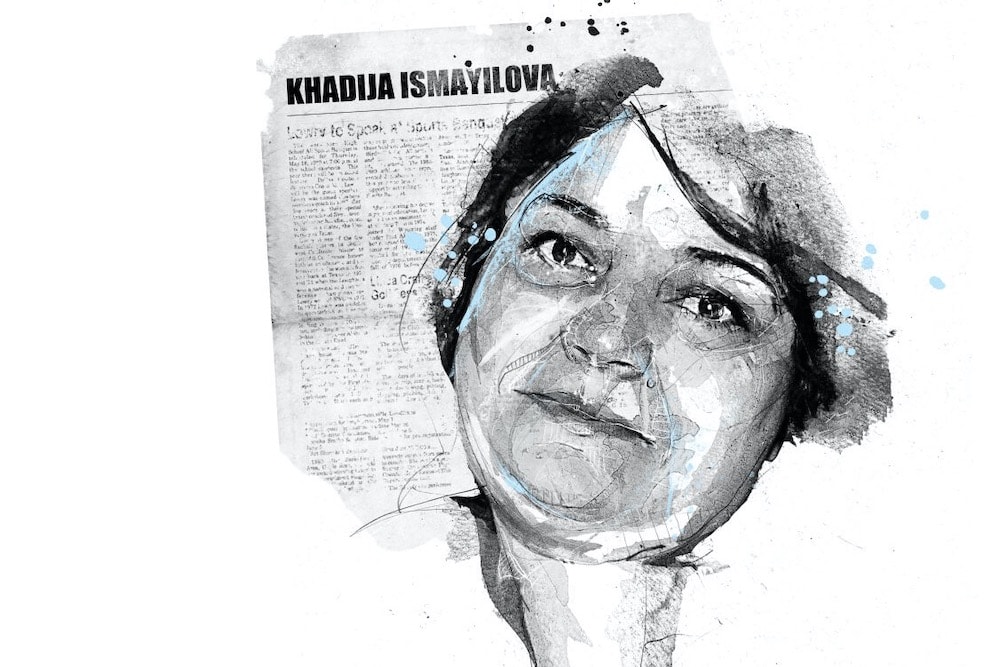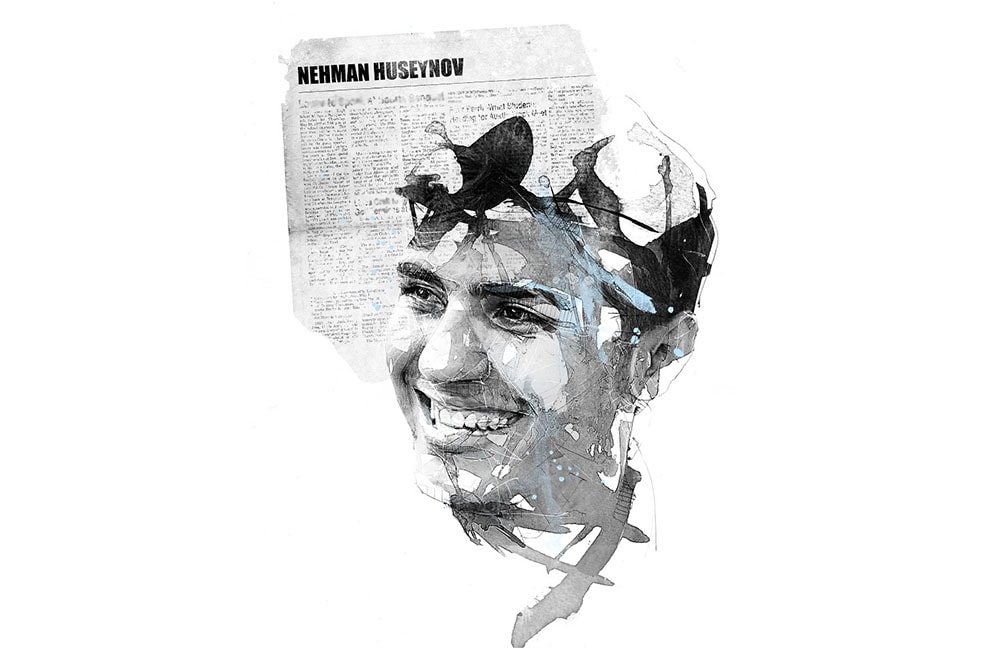Harassment, public humiliation, and 7 years of prison: The price Khadija Ismayilova paid for exposing her government's most peculiar business practices.
In March 2011, Khadija Ismayilova published a public statement on Facebook after having received a blackmail letter. The statement read, in part: I said I'm not going to stop any of my investigations, and I said I'm not going to shut up. I'm not ashamed of anything in my life, I'm not ashamed of anything I've been doing, and if they think that they shamed me - and that will stop me - they're wrong.
Investigative journalist Khadija Ismayilova has become the most recognisable face of the acute repression of journalistic freedom in Azerbaijan. Subjected to years of harassment and state media orchestrated humiliation, she was sentenced in September 2015 to 7.5 years in prison in what many deem to be politically motivated charges.
Ismayilova started her career as an interpreter at a Baku newspaper before becoming a reporter. As she told the International Women’s Media Federation – which granted her their 2012 Courage in Journalism award – she had been content to be an everyday journalist until 2005 when the murder of the eminent investigative reporter Elmar Huseynov, shocked her into action. “The first thing I thought when I heard that he was killed was ‘it’s my responsibility too. It’s my fault as well, because he was doing it alone’…We all were doing this easy journalism and he was doing the uncovering…alone.” From that moment on, Ismayilova took up investigative journalism with a fearlessness that earned her harassment, a vicious campaign of humiliation in the media, and, finally, in December 2014, a prison cell.
It is her tenacious delving into corrupt business practices that has brought Ismayilova to attention. As Baku bureau chief for Azadliq, Radio Free Europe/Radio Liberty‘s Azerbaijan service, and working with the Organised Crime and Corruption Reporting Project, she exposed official corruption, especially the nepotism within the highest levels of Azerbaijan’s leadership. Her exposés have focussed on President Ilham Aliyev’s wife and daughter who, her research disclosed, benefited from a contract to build the Crystal Hall where the 2012 Eurovision Song Contest was to be held. Rights to income from a gold field, a newly privatized bank and airline, and Azerbaijan’s largest mobile phone company were other spoils enjoyed by the Aliyev family disclosed by Ismayilova.
Ismayilova first came to international attention in 2012 when she took the courageous decision to stand up against the publication of personal videos of a sexual nature rather than to be intimidated into silence. The pro-government Yeni Azerbijan had published intimate images of her with her partner, which it said showed Ismayilova to be immoral. Earlier, Ismayilova had received a message stating “Whore, behave. Or you will be defamed”. Such tactics are not unusual in Azerbaijan where human rights defenders have found themselves subjected to sexually explicit material on the media. However, most remain quiet, either intimidated or hoping that the situation will blow over. Not Ismayilova. She publicly acknowledged the images, traced the source to a phone company employee who had secretly installed cameras in her home, and passed this information to the prosecutor’s office. No action was taken and the images continued to be republished throughout the following months. In November 2012, IFEX profiled Ismayilova in its International Day to End Impunity campaign.
Her situation reached boiling point in October 2014, when a former parliamentarian served a libel case against Ismayilova, who had suggested that she had been involved in infiltrating opposition groups for the intelligence services. Soon after, she was banned from leaving the country. Then, on 5 December 2014, she was arrested, ordered to serve a two-month pre trial sentence, on spurious charges of inciting the suicide of a former staff member. While she was in prison, police raided the Azadliq offices, questioned staff, seized equipment and documents, then sealed the premises. In January 2015, the charges against Ismayilova were changed to fraud, embezzlement, tax evasion and abuse of power for which should could be sentenced to up to 12 years. Her trial opened on 7 August 2015.
On 31 August 2015, Ismayilova read a powerful, final statement in court, in which she asserted, “Yes, I might be in prison, but the work will continue.”
On 1 September 2015, Ismayilova was sentenced to 7.5 years in jail after the Baku Court of Grave Crimes convicted her on charges of embezzlement, illegal entrepreneurship, tax evasion, and abuse of office. The Sport for Rights Coalition and many IFEX members publicly condemned the sentence.
On 3 May 2016, Ismayilova received the 2016 UNESCO/Guillermo Cano World Press Freedom Prize. The prize honours those who have made “an outstanding contribution to the defence and, or promotion of press freedom anywhere in the world, and especially when this has been achieved in the face of danger.” Previous laureates include Mazen Darwish, Ahmet Şık and Reeyot Alemu. Unable to attend the award because of travel restrictions, her mother came in her place and read out her daughter’s defiant statement in which she called on everyone to “Stand up for the truth, and dare to ask questions and be critically minded”.
Three weeks later, on 25 May 2016, the Supreme Court of Baku ordered Ismayilova’s conditional release and amended her imprisonment to a 3.5 year suspended sentence, according to Reuters. The court also subjected her to a travel ban and other restrictions.
Prior to the news of her release, the Sport for Rights Coalition organised a global action to mark her 40th birthday on 27 May 2016, in 40 cities around the world. Gatherings still went forward, and participants celebrated Ismayilova’s release, calling for her full acquittal and the release of Azerbaijan’s dozens of remaining political prisoners.
Since her release, Ismayilova has continued to be a vociferous critic of the Aliyev regime and an advocate for justice. In January 2019, she joined a hunger strike in solidarity with the then jailed IFEX member Mehman Huseynov, who had been dubiously charged with assault shortly before he was due to be released from prison.
There was also a moment of personal triumph in January 2019, when the European Court of Human Rights ruled that Azerbaijan had violated Ismayilova’s rights to private and family life and to freedom of expression. It had done this, the Court said, by failing to conduct an effective investigation into the 2012 filming and publication of the aforementioned videos depicting Ismayilova’s intimate life, and by disclosing her private information in a report on the status of that investigation. The court ordered Azerbaijan to pay the journalist 15,000 euros for pain and suffering and another 1,750 euros to cover her court costs and expenses.
On 7 August 2019, the Azerbaijani Supreme Court upheld Ismayilova’s baseless 2015 conviction for tax evasion.
In February 2020, the European Court of Human Rights again ruled in the journalist’s favour, judging that Azerbaijan had arbitrarily detained her, and that it had violated her right to presumption of innocence, when she was arrested on fabricated charges in December 2014 (and then held behind bars until May 2016). The Court ordered Azerbaijan to pay Ismayilova EUR 20,000 in compensation.
Ismayilova is currently editor-in-chief of the independent media outlet Toplum TV. In March 2024, the authorities raided Toplum TV’s offices and the homes of some of its staff, detaining several journalists. Ismayilova, who was not detained, said of the raid: “It looks like [the authorities] want to fully liquidate independent media in the country to leave no platform for critical opinions.”
Illustration by Florian Nicolle


